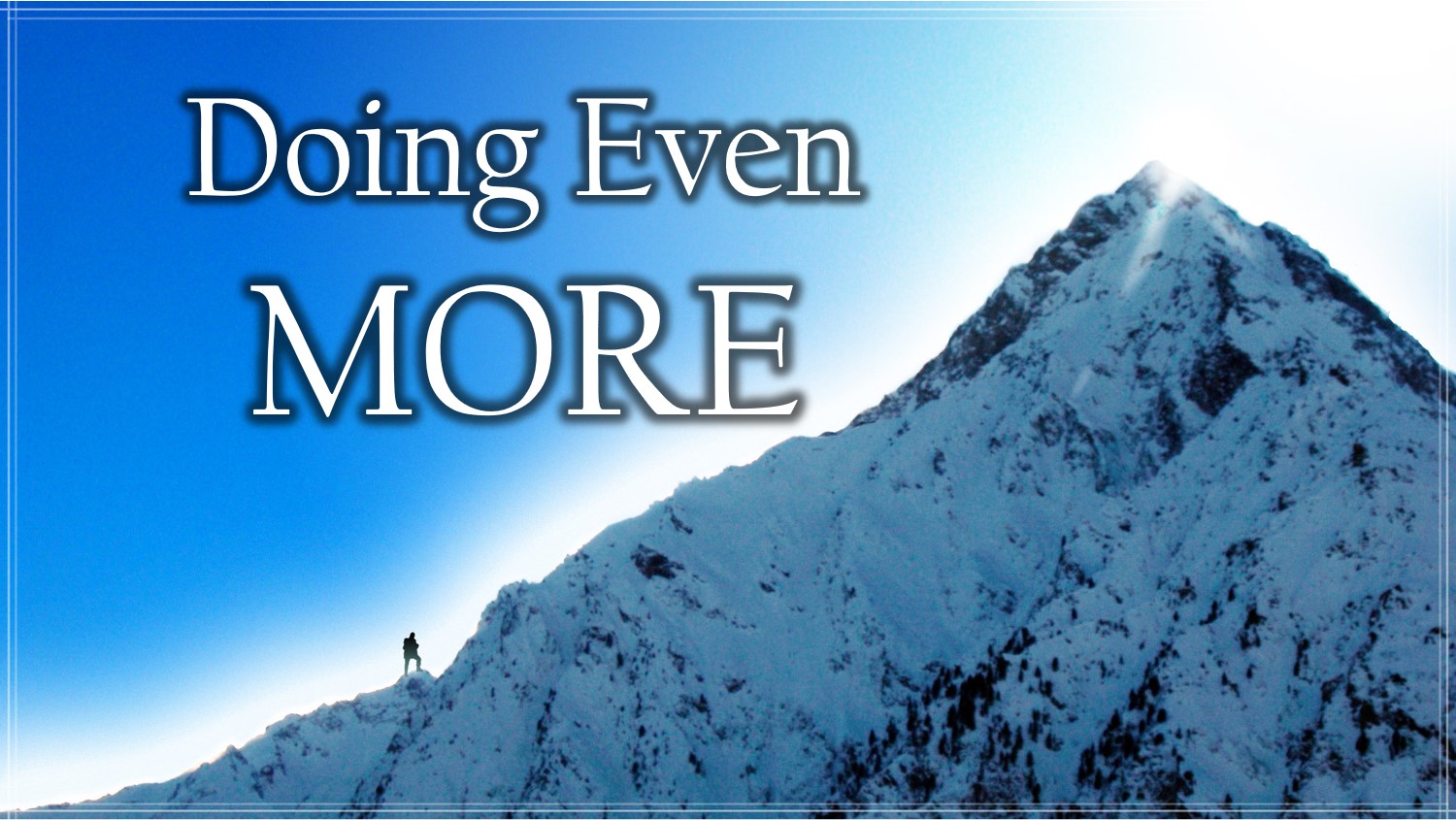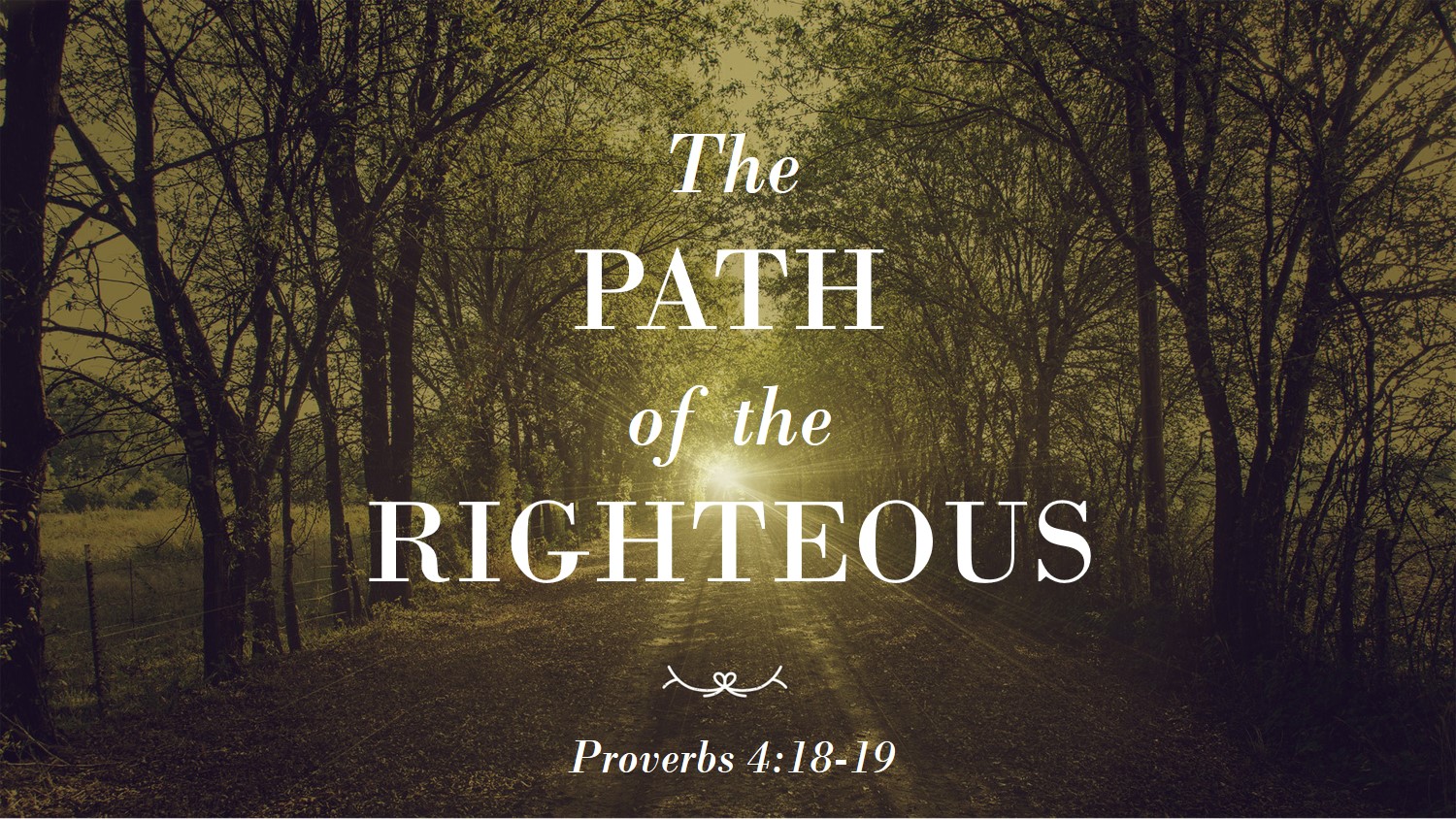Blog
Doing Even More
Wednesday, June 09, 2021
There are many things that I love about being a preacher, but one of my favorites is the encouragement I get from good people who are diligently seeking God. For me these days, it seems like every Sunday night is a Paul-in-1-Thessalonians 3 moment. Since the big pandemic shutdown late last year, it’s been a joy to watch our evening attendance slowly rebuild itself.
The progress hasn’t been linear, but on the attendance charts, it’s plain to see. More and more, the members here, people who had gotten out of the habit of worshiping on Sunday nights, are investing the effort to re-instill that habit. I think that’s great, and it speaks volumes about who all the people who are here tonight want to be.
To the Sunday evening crowd, then, I can only repeat Paul’s commendation in 1 Thessalonians 4:1. All you can say to the folks who are already working is encouraging them to do better! Though obviously there are any number of ways that all of us can improve in our service to God, there are three that I want to focus on this evening, ways that every brother and sister here can do even more.
The first of these is to MAKE THE MOST OF THE TIME. Consider Paul’s words in Ephesians 5:15-16. I think his reasoning here is fascinating. He says some familiar things: pay attention, and make the most of your time. However, his reasoning is not very familiar at all. We should do these things because the days are evil. In other words, we should take advantage of the opportunities we have right now because life is hard, the future is uncertain, and we may never get opportunities like this again.
If there is any lesson that we should have learned from the pandemic, surely this is it! On January 1, 2020, none of us anticipated the way that the next 18 months were going to go. We had no idea how greatly our lives were going to change. For many of us, we had no idea that an illness from the other side of the globe was going to put those lives in danger.
On January 1, 2020, all of us were rotten future-predictors. On June 6th, 2021, are any of us any better future-predictors? We have no idea what the future holds! For all we know, on January 1, 2023, we might not even be here anymore!
This tells us, then, that the time for serving God in all those ways we’ve been thinking about is not 18 months from now, or at some indefinite point in the future. That time is now.
This could mean any number of things for us. It could mean that we follow through on that good intention of being here every time the doors are open. It could mean that we commit to spending more time on our kids and grandkids instead of work and hobbies. It could mean that if we fell off the daily-Bible-reading wagon in February, we get back on it in June. I don’t know what the answer is for all of you, but I think each of you knows what it is for yourself.
The future is uncertain. We might not be able to act then, but all of us can act now. Every day that God gives us is a priceless opportunity. Let’s use each of them to glorify Him.
Second, let’s recognize the opportunity we have right now to LOVE OUR NEIGHBOR. Jesus emphasizes the importance of love in Matthew 22:34-40. This is a familiar passage to most of us, but I think there is a particular application that we need to consider. Remember how back during the pandemic, we would check the CDC site every day to get the latest COVID numbers? Right now, there’s a public-health crisis going on that may be even worse, but nobody is updating a website daily about it. It’s a mental-health crisis.
Human beings are social creatures. God designed us to enjoy and even need being around others. This is why in prison, the worst thing that you can do to punish somebody who has been locked away for life is to put him in solitary confinement. Well, brethren, for the past 18 months, COVID plus government intervention has put us all in solitary confinement, and the mental damage that has done is incalculable.
Worse still, the disease prevents the cure. If you’ve got COVID bad, you’re going to go to the hospital, but if you’re badly depressed, you’re not going to want to go anywhere or do anything to get better. None of us have the foggiest idea how many Americans are in this predicament, but I would guess that they number in the tens of millions. Each one of those people is a silent tragedy.
If they can’t reach out to us, we need to reach out to them. We need to be checking up on the people we know, both inside and outside the church, and engaging deeply enough with them to make sure that they’re OK. This is particularly true for those whose behavior has changed significantly pre-pandemic to post-pandemic. There may well be a problem there, and we need to love our neighbor enough to find the truth and act to help if needed.
Finally, let’s PRAY FOR DOORS. Paul advises the Colossians to do so in Colossians 4:2-4. It’s axiomatic that people start seeking the Lord in hard times. We see this pattern occur repeatedly in the book of Judges, among many other places in Scripture. We have undeniably been through a hard time, so what does that tell us that a lot of people have been thinking about?
Once again, though, these people aren’t necessarily going to be boldly coming to us. If you don’t have God in your life, and COVID has got you thinking about the frailty and insecurity of human existence, that’s a pretty depressing line of thought! Right now, the people who most see their need for God and would be most willing to accept Him may well also be those who are least able to do anything about it. They’re really unlikely to show up on their own at a church building full of people they don’t know.
What do we do about it? We pray about it, that’s what! We ask that God through His providence will lead us to encounter people who will be receptive to the gospel. Of course, if we are loving our neighbor as we should and checking up on people, we show God that we will walk through the door if He opens it, and we make it more likely that opportunities will arise.
When that door opens, you don’t have to be Jesus or the apostle Paul to take advantage, either. I’m here to tell you: converting somebody who isn’t ready for the gospel is impossible, but converting somebody who is, is easy. Even if you’re not up for even a basic study, you’re up for inviting somebody to services. Just do that, and keep praying, and good things will happen.
The Promise of Affliction
Monday, June 07, 2021
If there is anything that Americans like, it is the easy way. A decade or two ago, the office-supply chain Staples ran a series of ads featuring the Easy Button, a big red button that you could push to accomplish whatever it was that you wanted done. As funny as the commercials were, most people in our country would love to Easy-Button their way through life, reaping the rewards of virtue without putting in the work.
Not surprisingly, this attitude has permeated American religion too. The most popular preachers of our time promise every earthly blessing and demand very little in return. If you want the rewards of prosperity and happiness in this life, Jesus will be happy to provide those things to you. You don’t have to live a life of humility, service, and self-sacrifice. All you have to do is write a check to the guy with the perfect coiffure, the fancy suit, and the million-dollar smile.
What the Bible actually teaches, though, is very different. Yes, the promises that the gospel makes are extravagant. They start with eternal life and go on from there. However, rarely do they concern this-life prosperity, and they come with a catch. If you want to live with Jesus forever, you’d better seek Jesus now.
This process is not easy and painless. Indeed, the opposite is true. In 1 Thessalonians 3:4, Paul reminds the Thessalonians that during the three weeks he spent in Thessalonica, he warned them that they would face affliction for the sake of Christ. Paul didn’t have time to teach them much of anything, but the warning of future adversity was so important that he made time for that.
His prediction was fulfilled very quickly. The same angry mob that chased Paul out of town also laid hands on several of the new Christians. A few decades down the road, the Roman Empire itself would engage in persecution of the early church.
The problem is simple. Jesus is a polarizing figure. Either you love Him, or you want nothing to do with Him. People who love Jesus are called “Christians”, and we find them in His church. People who don’t want anything to do with Him are those outside, and if they don’t like Jesus, they aren’t going to like the people who are trying to be like Jesus either.
If we are loud and proud about our allegiance to the Lord, if we are eager to lead others to Him, and if we stand with Him against every form of evil, all of those things are going to generate pushback from the world. This is always going to happen, whether the ones offended are secular or “religious” like the Pharisees who opposed Jesus. We’ve confronted them with something they don’t like, so they’re going to repay us in kind. The only way to avoid this kind of affliction is to conceal our faith, but if we do that, we are imitating neither the Thessalonian disciples nor the Lord Himself.
Two Unchangeable Things
Friday, June 04, 2021
In addition to the other things that make Hebrews challenging for us to follow, the writer assumes that his readership is familiar with the Old Testament. He jumps from allusion to allusion, rarely pausing to explain his references to the Law with more than a phrase or two. However, because our Old-Testament knowledge is rarely the equal of a first-century Jew’s, it’s often worthwhile for us to slow down, flip back to the front part of our Bibles, and figure out what in the world the writer is talking about!
This is certainly useful in Hebrews 6:13-18. The conclusion here is relevant to every Christian—that we should have strong encouragement to seize the hope that is before us. However, the discussion before the conclusion omits the information we need to reach that conclusion. In order to figure out what’s going on, we have to go back to the incident he is discussing, the conversation between God and Abraham in Genesis 22:15-18.
Contextually, Abraham has just won God’s favor by demonstrating his willingness even to sacrifice his own son if God commands him to do so. Now, He is about to explain what this means for Abraham. God begins by swearing an oath by Himself. This is not usual; in fact, there are only three places in the whole Bible where God swears an oath by Himself. Then, He tells Abraham, “I will indeed bless you.”
This is what the writer is talking about in Hebrews 6:17. “I will indeed bless you,” is God’s unchangeable purpose. “By Myself I have sworn,” is the oath He used to guarantee His promise. As the writer observes in 6:18, it’s impossible for God to lie in either of these things, which is where the strong encouragement comes from.
However, the writer does not explain (because he expects his audience to know already) what an ironclad promise that God made to bless Abraham has to do with us. If we can’t fill in that blank on our own, we have to go back to Genesis 22:17-18. There, God specifies that His blessing will take two forms. First, Abraham’s offspring will be as numerous as the stars and the sand. Second, through his seed (singular, not plural, as Paul notes in Galatians 3:16), all the nations of the earth will be blessed.
Now we start seeing why this is relevant! According to Galatians 3:7-9, everyone who has faith is a descendant of Abraham, whether they are Jew or Gentile. Second, as per Galatians 3:16, the singular seed of blessing is Jesus.
Thus, God’s unchangeable purpose and oath have done two things. First, they have prepared a special people for Him, a people that comprises everyone who seeks Him in faith. Second, those two unchangeable things guarantee that those who seek will find blessing in Him through Christ.
Ever wonder if you really, really are going to inherit eternal life because you are faithful? You don’t have to wonder. God has both pledged and sworn it by Himself, and for us, that is strong encouragement indeed!
Psalm 136
Thursday, June 03, 2021
Psalm 136 (LMD)
Give thanks to God, for He is good!
His love endures eternally;
The God of gods and Lord of lords,
His love endures eternally.
He spread the earth above the void;
His love endures eternally;
He set the sun and moon on high;
His love endures eternally.
From Egypt, He brought Israel out;
His love endures eternally;
With mighty hand and outstretched arm;
His love endures eternally.
He took them safely through the sea;
His love endures eternally;
But Pharaoh and his host were drowned;
His love endures eternally.
He led them through the wilderness;
His love endures eternally;
He slaughtered great and mighty kings;
His love endures eternally;
He gave His faithful ones the land
His love endures eternally;
To be their own inheritance;
His love endures eternally.
He knew us in our lowliness;
His love endures eternally;
And rescued us from every foe;
His love endures eternally;
To all who live, He gives their food;
His love endures eternally;
Give thanks to Him who reigns above;
His love endures eternally.
Suggested tune: SWEET HOUR
(“Sweet Hour of Prayer”)
The Path of the Righteous
Wednesday, June 02, 2021
Back when Clay and I were organizing our preaching for the month of May, he texted me and asked what two light topics I wanted to preach on. About 10 seconds later, I replied with Psalm 27 and the text I’m going to be preaching on this morning. “Wow; that was quick!” Clay responded.
There’s a reason for that, and it’s because both Psalm 27 and this morning’s passage are passages that I love, passages that make me smile whenever I read them, passages that I try to carry around with me everywhere I go to make sense of life.
Psalm 27 is great, but if I had to pick one of the two, after offering to give up a limb instead, I would pick this morning’s. Look with me at Proverbs 4:18-19. These are two short verses, but they encapsulate everything I love about the word of God. They are simple, they are beautiful, and they are profound. Indeed, they are so profound that I intend to spend all of my time in the pulpit this morning without citing another verse. Let’s see, then, what we can learn from a close examination of the path of the righteous.
There are three key elements in this proverb that help us to understand it, and the first of the three is THE PATH. Note first of all that Solomon says that there is both the path of the righteous and the way of the wicked. In other words, everybody is on a spiritual path.
This seems simple, but it’s quite meaningful. Sometimes, you run into people who think they are spiritually neutral. They’ll tell you that they leave all that God stuff to somebody else and mind their own business. Well, they might think they’re neutral, but God doesn’t think they’re neutral, and the devil doesn’t think they’re neutral either. Their feet are on a path, and they are headed to a destination.
Second, it’s worth noting too that everybody’s path starts out dark. Yes, Solomon says that the path of the righteous is like the light of dawn, but what’s it like before the light of dawn shows up? It’s dark!
In other words, both the righteous and the wicked start out without a spiritual clue. When first we hit that age of accountability, none of us have any sense. We may be blessed with godly parents or other mentors, who are sort of like a spiritual flashlight, but those without help are blundering around in the woods at midnight. Max Dawson likes to say that if you haven’t wrecked your life by the time you turn 22, you probably won’t, but sadly, lots of people do wreck their lives before that. Sometimes their bad decisions leave them with a criminal record or a drug habit; sometimes they cost them their lives and their souls.
Finally, as the above implies, everybody’s path is dangerous. This isn’t like one of those “trails” in the national parks that are four feet wide, paved, and wheelchair-accessible. Instead, it’s more like a deer path in the woods in the middle of nowhere. That’s the way life is for all of us. It’s filled with all kinds of trials and temptations and traps. The devil hopes that we will come crashing into every one of them.
However, the difference between the path of the righteous and the path of the wicked is that the former is illuminated by THE LIGHT OF DAWN. This we should understand not literally, but metaphorically, as referring to spiritual enlightenment. The Bible speaks of many ways we can become enlightened. We can study the word, which is a lamp to our feet and a light to our path. We can benefit from the instruction of older, more mature Christians. We can pray for wisdom. We can observe the lives of others.
Regardless, this is the key difference between the righteous and the wicked. This is what determines the course of our lives and our eternal destinies. The righteous seek enlightenment and benefit from it. The wicked don’t.
Second, because the enlightenment of the righteous is like the dawn, this tells us that the process is gradual. How many of you have ever been outside waiting throughout the time from pitch blackness to full day? It’s not like God flips on a light switch, is it? It’s sloooow! At any given point in the process, the change that is occurring is imperceptible.
So it is with our spiritual enlightenment. There are lots of people who want the wisdom without the Bible study and the meditation and the prayer. Guess what? It doesn’t work like that. If we want God to illuminate our world for us, we have to seek Him day by day, week by week, month by month, year by year, decade by decade. There are no quick fixes. If we want our path to get brighter, there is no substitute for time and effort.
However, as slow as it is, the light of dawn is transformative. You start out in pitch blackness, then you start seeing dim outlines, then a black-and-white vision of reality. Finally, everything fills in with color, and there’s no sign left that such a thing as night even existed.
This is how the illumination of spiritual wisdom is. It changes everything. We see life and the things of eternity in vastly different terms than the people of the world do. The more enlightened we become, the greater the difference between us and everybody else becomes too.
This difference consists of KNOWING OR NOT. The path of the righteous gets brighter and brighter until the course of their lives is fully illuminated. This doesn’t mean that the path of the righteous is safe. I have scrapes on my shins right now because I tripped over a branch in the woods in broad daylight.
So it is for us spiritually too. No matter how wise and spiritually enlightened we become, the devil still trips all of us up occasionally. However, we are able to avoid most of the sins that would entangle us, and even when we do get entangled, at least we know what happened and can learn from it.
It is not so for the wicked. The wicked aren’t hiking through the woods in the daytime. They’re still out there in the dark. Again, this may not be something that we experience normally. The streets of my neighborhood all have streetlights. If I want to, I can go wandering around in reasonable safety.
However, that wasn’t the experience of the ancient Israelites, and if we’re out in the boonies, even today, on an overcast night, it can get can’t-see-your-hand-in-front-of-your-face kind of dark. That’s what life is like for the wicked, but they’re trying to go down the path anyway, and, as you would expect, they end up tripping over all kinds of stuff. The sins and troubles that the righteous see and avoid are the most prominent features of the lives of the wicked. Spiritually speaking, their shins look like somebody’s been whaling on them with a golf club!
Worse still, the wicked don’t even know why they’re stumbling. They don’t get it, they don’t learn, and they go on doing the same dumb stuff. You ever known somebody like that? It seems like their life is playing the disaster song on repeat. Over and over and over again, it’s the same mistakes. These are people who don’t learn because they refuse to learn.
It might seem hard to be righteous. It might seem hard to make that effort to be here Sunday morning and Sunday evening and Wednesday evening. It might seem hard to make time for that Bible reading every morning. It might seem hard to remember to constantly seek wisdom from God in prayer. You know what’s a lot harder? Not doing any of those things.


